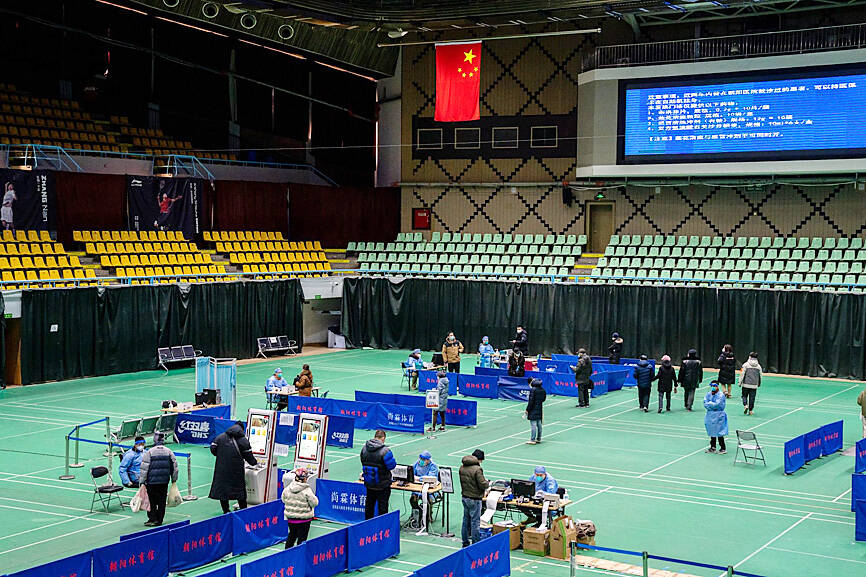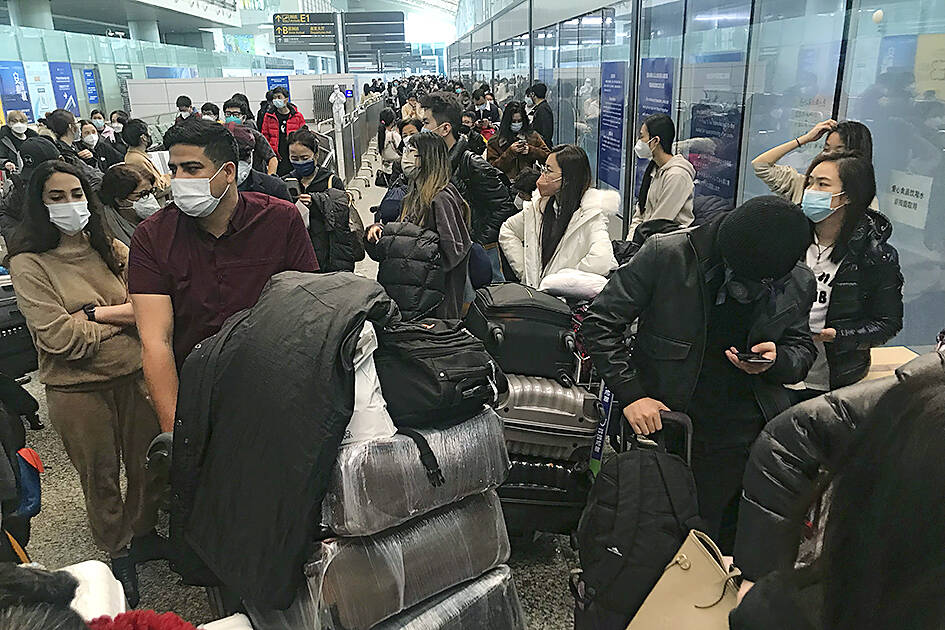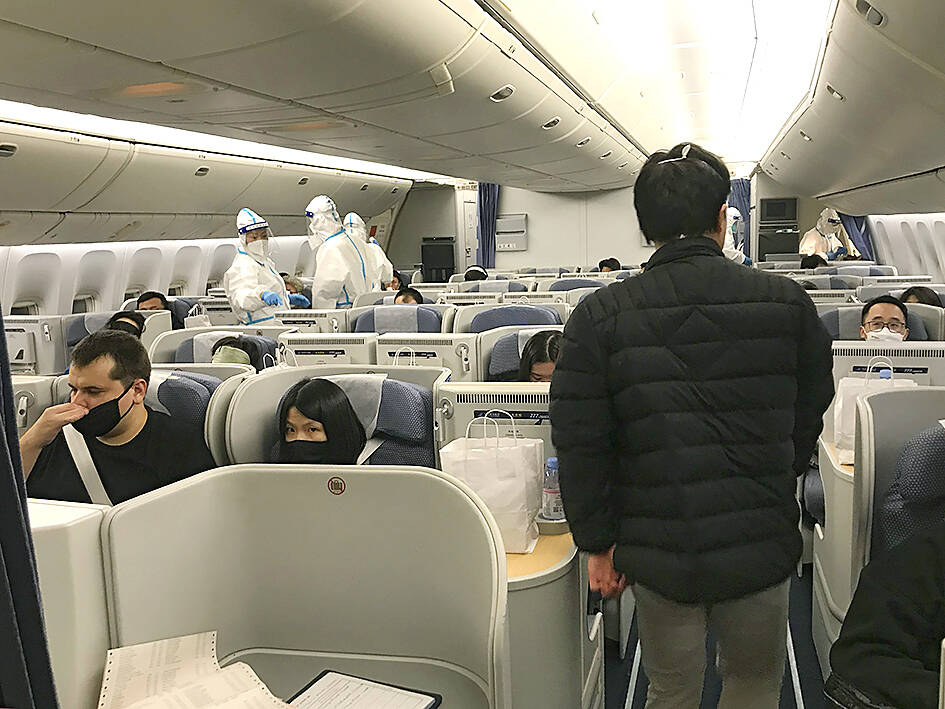The Central Epidemic Command Center (CECC) yesterday said that it would conduct a rolling review of entry restrictions and testing requirements for arrivals from China after Beijing on Monday announced that mandatory COVID-19 quarantine for overseas arrivals would end on Jan. 8.
However, Taiwan would not follow Japan in tightening quarantine measures for travelers from China, said Centers for Disease Control Deputy Director-General Chuang Jen-hsiang (莊人祥), the CECC’s spokesman, after people in China yesterday rushed to book trips abroad given the promise of eased requirements at home.
The CECC would continue to provide at-home rapid test kits for travelers arriving at international airports, Chuang said.

Photo: Bloomberg
They would also be subject to the “5+N” rule — five days of home isolation, followed by up to seven days of self-health management until they test negative with a rapid test — if they are diagnosed with COVID-19 in Taiwan, he said.
Some Chinese might face hurdles when they go abroad as some countries have reinstated testing requirements for incoming travelers from China, including India and Italy, while Japan yesterday announced that from Friday it would require COVID-19 testing on arrival for travelers from China.
Rising cases in China were “causing growing concern in Japan,” Japanese Prime Minister Fumio Kishida said.

Photo: AP
In Beijing, the Chinese Ministry of Foreign Affairs said that countries should uphold “scientific and appropriate” disease controls that “should not affect normal personnel exchanges.”
Asked if Taiwan might follow China in downgrading COVID-19 to a lower category of notifiable communicable disease, Deputy Minister of Health and Welfare Victor Wang (王必勝), who heads the CECC, said that Taiwan is moving at its own pace, so adjustments would be announced at an appropriate time.
The CECC would reference other countries such as Japan and the US when determining the right time to downgrade COVID-19, Wang said.

Photo: AP
It would be shortly after the Lunar New Year holiday at the soonest, he said.
Meanwhile, Chinese reacted with joy and rushed to book trips after Beijing’s announcement that it would scrap mandatory quarantine after almost three years of self-imposed isolation.
“I felt like the epidemic is finally over... The travel plans I made three years ago may now become a reality,” said Fan Chengcheng, 27, a Beijing office worker.
A Shanghai resident surnamed Chen said that the policy shift “felt like someone has pressed the button to end the movie,” adding that it would allow her parents in Britain to visit her more easily.
“Finally, China’s going back to normal,” she said. “It shows there are people who still care about global commerce and the impact on the Chinese economy.”
Online searches for flights abroad surged on the news, with travel platform Tongcheng reporting an 850 percent jump in searches and a 10-fold spike in inquiries about visas, state media reported.
Rival platform Trip.com Group said that the volume of searches for popular overseas destinations rose by 10 times year-on-year within half an hour of the announcement.
Users were particularly keen on trips to Macau, Hong Kong, Japan, Thailand and South Korea, it said.
Additional reporting by Lee I-chia and CNA

DEFENDING DEMOCRACY: Taiwan shares the same values as those that fought in WWII, and nations must unite to halt the expansion of a new authoritarian bloc, Lai said The government yesterday held a commemoration ceremony for Victory in Europe (V-E) Day, joining the rest of the world for the first time to mark the anniversary of the end of World War II in Europe. Taiwan honoring V-E Day signifies “our growing connections with the international community,” President William Lai (賴清德) said at a reception in Taipei on the 80th anniversary of V-E Day. One of the major lessons of World War II is that “authoritarianism and aggression lead only to slaughter, tragedy and greater inequality,” Lai said. Even more importantly, the war also taught people that “those who cherish peace cannot

STEADFAST FRIEND: The bills encourage increased Taiwan-US engagement and address China’s distortion of UN Resolution 2758 to isolate Taiwan internationally The Presidential Office yesterday thanked the US House of Representatives for unanimously passing two Taiwan-related bills highlighting its solid support for Taiwan’s democracy and global participation, and for deepening bilateral relations. One of the bills, the Taiwan Assurance Implementation Act, requires the US Department of State to periodically review its guidelines for engagement with Taiwan, and report to the US Congress on the guidelines and plans to lift self-imposed limitations on US-Taiwan engagement. The other bill is the Taiwan International Solidarity Act, which clarifies that UN Resolution 2758 does not address the issue of the representation of Taiwan or its people in

US Indo-Pacific Commander Admiral Samuel Paparo on Friday expressed concern over the rate at which China is diversifying its military exercises, the Financial Times (FT) reported on Saturday. “The rates of change on the depth and breadth of their exercises is the one non-linear effect that I’ve seen in the last year that wakes me up at night or keeps me up at night,” Paparo was quoted by FT as saying while attending the annual Sedona Forum at the McCain Institute in Arizona. Paparo also expressed concern over the speed with which China was expanding its military. While the US

‘FALLACY’: Xi’s assertions that Taiwan was given to the PRC after WWII confused right and wrong, and were contrary to the facts, the Ministry of Foreign Affairs said The Ministry of Foreign Affairs yesterday called Chinese President Xi Jinping’s (習近平) claim that China historically has sovereignty over Taiwan “deceptive” and “contrary to the facts.” In an article published on Wednesday in the Russian state-run Rossiyskaya Gazeta, Xi said that this year not only marks 80 years since the end of World War II and the founding of the UN, but also “Taiwan’s restoration to China.” “A series of instruments with legal effect under international law, including the Cairo Declaration and the Potsdam Declaration have affirmed China’s sovereignty over Taiwan,” Xi wrote. “The historical and legal fact” of these documents, as well